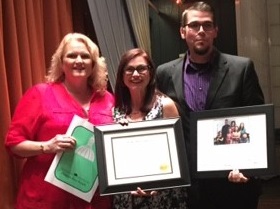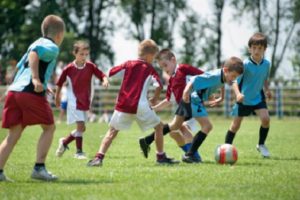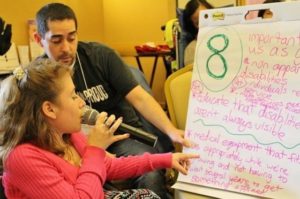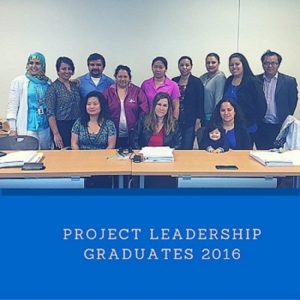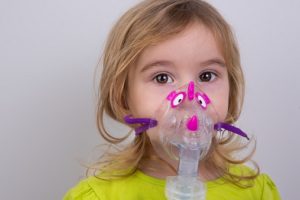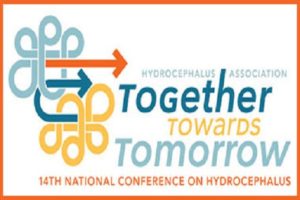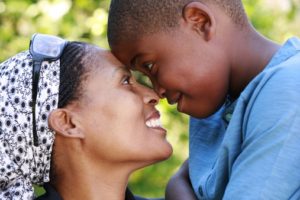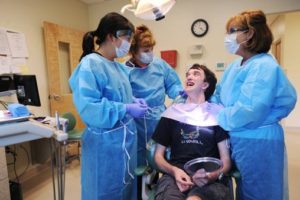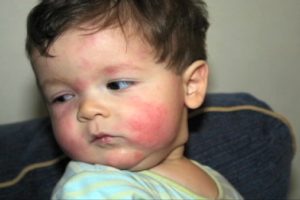This newsletter was sent June 28, 2016. If you’d like to receive our next bi-weekly digest full of a curated collection of resources, workshops, policy highlights, and action items that affect children and youth with special health care needs, please sign up here.
NEWS
Concord Mom Receives Advocacy Award, State Assembly Recognition For Work On Successful Adult Changing Table Bill
FVCA Project Leadership graduate Alisa Rosillo was given the Roz Wofsy Advocacy Award earlier this month by the Developmental Disabilities Council Of Contra Costa County in honor of her work on AB 662. She also received a certificate of recognition from the California State Assembly in commemoration of her selection as a Roz Wofsy recipient.
Signed into law on October 10, 2015, AB 662 requires that all “commercial places of public amusement” built after January 1, 2020 include and maintain at least one adult changing station for people with disabilities. Businesses that are renovated after January 1, 2025 must also upgrade their grounds to include an adult changing station.
Both Alisa’s children, Max, 15, and Leo, 17, require diaper changes and exceed the size and weight limit of a typical child’s changing table. Inspired by the wish to include her teenagers in regular outings all kids love, Alisa used the skills learned through the Project Leadership course to hone her voice and build her advocacy platform. Conversations and meetings with her local Assemblymember, Susan Bonilla, then led to the formation and passage of AB 662.
No stranger to the world of policy, Alisa worked with then-Assemblymember, now Congressman, Mark DeSaulnier to pass AB 1531 in 2007. This bill raises the fine for those abusing disabled parking spots and ensures these spaces and aisles are visibly painted blue and white.
Alisa’s advocacy also extends to education—she’s been working within the Contra Costa School District to create K-12 classrooms that allow students who use speech generating devices to access curriculum. Her eldest son, Leo, will be aging out of the school system this year, so she’ll be looking at how these classroom models can continue in a bridge type program over the next four years.
On the changing table front, Alisa now hopes to take the topic to the national level with the backing of Congressman DeSaulnier. “Since bathroom issues are in the national spotlight, the timing is right and the fire is hot,” she says. “We have the momentum to take this to the next level.” For a look at Alisa’s past advocacy work, click here.
California Ranked #36 In Child Well-Being—Slight Increase From 2015’s #38
A new report from the Anne E. Casey Foundation and Children Now, Kids Count: State Trends In Child Well-Being, ranks California’s overall child well-being at #36 (with #1 being the best). The data examines four sub-sections: economic well-being (#47), family and community (#41), education (#35), and health (#11). The report found there have been fewer child deaths and teen pregnancies, a rise in the number of insured kids, and more high schoolers graduating on time. However, Generation Z children face “the weakest economic prospect in three generations,” stagnant wages, and high college costs. 23% of children live in poverty and 33% of parents lack stable employment—both figures have increased since last year. To read an article pulling further key points from the report (and the report itself), click here.
GIVE INPUT
Federal Panel On Autism Seeks Public Comment
The Interagency Autism Coordinating Committee is looking for input from people with autism, family members, service providers, and advocates as they prepare to revise their strategic plan and update government priorities on autism research, services, and policy for the first time in ten years. The committee addresses seven topics: screening and diagnosis, the underlying biology of autism, risk factors, treatments and interventions, services, lifespan issues/surveillance, and infrastructure—comments should be related to one or more of these topics. To provide feedback, click here for a survey.
Survey: The Parent Experience Of Advocating For Children With Special Needs
California State University, East Bay is conducting a survey on the parent experience of advocating for children with special needs. The results will be used to inform the services and polices that serve this population. Survey participants will be entered in a drawing to win a $50 Amazon gift card. For more information and a link to the survey, click here (Spanish instructions here).
RESOURCES
Sickle Cell Materials Now Available In Spanish And French, New Supplement
The National Center On Birth Defects And Developmental Disabilities recently translated key sickle cell fact sheets into Spanish and French. To access the new materials, click here. Topics include getting screened, supporting students with sickle cell disease, tips for preventing infection, and more. The American Journal of Preventive Medicine has also released a new supplement that covers the state of sickle cell related care in the United States. To read the supplement, click here.
Playing It Safe: Bleeding Disorders, Sports, And Excercise
This publication from The National Hemophilia Foundation provides information to help children and teens with bleeding disorders safely participate in physical activity. It offers a list of illustrated stretches, safety ratings for many types of sports and activities, recommended strength training excercises, and more. To read the publication, click here.
Attacking Childhood Asthma: Care Coordination
A new white paper from the Health And Wellness Alliance For Children describes how care coordination played a key role in reducing pediatric asthma emergency room visits by 49% in Dallas, Texas. Three facets helped tie together care coordination: a standardized Asthma Action Plan, the mobile asthma-management app My Asthma Pal, and a community ambassador pilot program. To learn more about how these facets worked together and to read the white paper, click here (you can also create your own Asthma Action Plan and download the mobile app).
New Emergency Preparedness Curriculum For Families Of Children With Special Needs
The Eunice Kennedy Shriver Center worked with an advisory committee of parents of children with special needs to create a curriculum that increases preparedness knowledge and allows for successful planning. The curriculum includes a toolkit, tip sheets, and a template for a personal emergency plan. There’s also resources on how to share information about your child’s unique needs with first responders. To access the curriculum, click here.
WEBINARS
TONIGHT: Taking Control: 12 Things You Probably Don’t Know About Seizures And Epilepsy
Sponsor: Epilepsy Foundation Of Iowa
More information and registration here.
June 29: Top Five Advocacy Priorities For Mended Little Hearts And Children With Congenital Heart Defects
Sponsor: Mended Little Hearts
More information and registration here.
June 29: Rational Pain Management In Children With Chronic Medical Conditions
Sponsor: The American Academy Of Pediatircs
More information and registration here.
June 29: Supported Decision Making And Financial Choices
Sponsor: The National Resource Center For Supported Decision Making
More information and registration here.
June 30: The National Standards For Culturally And Linguistically Appropriate Services (CLAS) In Action
Sponsor: U.S. Department Of Health And Human Services Office Of Minority Health
More information and registration here.
June 30: The Use Of Health Information Technology To Improve Healthcare Delivery For Children
Sponsor: Agency For Healthcare Research And Quality
More information and registration here.
July 6: Utilizing A Care Manager In A Special Needs Trust
Sponsor: Friends Of Children With Special Needs
More information and registration here.
July 12: Overview Of Application Process For Request For Proposals On “Developing Goals And Strategies To Improve Care Of Children With Chronic And Complex Health Conditions”
Sponsor: The Lucile Packard Foundation For Children’s Health
More information and registration here.
July 14: Advancing Health Through Accountable Communities: A Conversation With States
Sponsor: The National Academy For State Health Policy
More information and registration here.
ARTICLES
“Families Face Indefinite Wait For Services“
“Down Syndrome Link Seen As Key To Understanding Alzheimer’s”
“Facebook Offers Tools For Those Who Fear A Friend May Be Suicidal”
“Apple To Add Fitness Tracking For Wheelchair Users To Apple Watch”
“What Life Is Like With Tourette Syndrome”
“Testing Drugs On Mini-Yous, Grown In A Dish“
“How To Transition Special Needs Students To The Workforce”
“No Amount Of Lead Safe For Children: AAP Calls For Stricter Regulations”
“Skateboard Clinic Teaches Kids With Disabilities Life—And Shredding—Skills”
“As Childhood Diabetes Rates Rise, So Do Costs—And Families Feel The Pinch: Study”
“Doctors Urged To Address Needs Of Females With Disabilities”
“Iowa Family Goes To Capitol Hill To Help Kids With Special Needs”
“Mom’s Effort Helps Add Defibrillators Throughout Simi Valley”
“Meet The Man With Cerebral Palsy Redefining ‘Disabled’ In Colombia”
“Celebrating 20 Years Serving The Chinese American Special Needs Community”
“Kids With Autism Are Using Google Glass To Learn Emotions”
“Telehealth Helps Diagnose A Potentially Lethal Heart Defect In 9-Month-Old”

